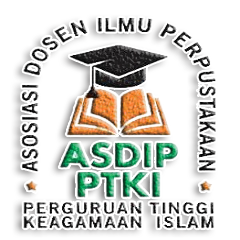Persepsi Mahasiswa Terhadap Konsep Blended-Eco Library di Perpustakaan Universitas Negeri Malang
Abstract
The environmental crisis has become an issue in various parts of the world, including Indonesia. Efforts to repair environmental damage are continuously being made by various institutions, including libraries. The Universitas Negeri Malang Library implements the blended-eco library concept as an effort to maintain a green environment and create a pleasant and serene learning atmosphere. However, many students are not interested and do not like being in the library. This poses a challenge for the Universitas Negeri Malang Library to attract students to come to the library. This research aims to understand students' perceptions of the blended-eco library concept implemented in the library, the factors influencing those perceptions, and the steps the library can take. Using a descriptive qualitative method with semi-structured interviews and literature studies. The results of this study indicate that overall, students' perceptions of the blended-eco library concept are positive. The main factors influencing the majority of students' perceptions are past experiences and the values held by individuals. Steps that the library can take include 1) improving and upgrading existing facilities, 2) creatively promoting programs, 3) providing user education to patrons in a more engaging manner.
Abstrak
Krisis lingkungan telah menjadi permasalahan di berbagai belahan dunia, termasuk Indonesia. Upaya untuk memperbaiki kerusakan lingkungan terus dilakukan oleh berbagai instansi, termasuk perpustakaan. Perpustakaan Universitas Negeri Malang menerapkan konsep blended-eco library sebagai upaya mempertahankan lingkungan hijau dan menciptakan lingkungan belajar yang asri dan menyenangkan. Namun, banyak mahasiswa yang tidak berminat dan tidak suka berada di perpustakaan. Hal ini menjadi tantangan bagi Perpustakaan Universitas Negeri Malang untuk menarik mahasiswa datang ke perpustakaan. Penelitian ini bertujuan untuk mengetahui persepsi mahasiswa terhadap konsep blended-eco library yang diterapkan di perpustakaan, faktor apa saja yang mempengaruhi persepsi tersebut dan langkah apa yang dapat diambil perpustakaan. Dengan metode kualitatif deskriptif menggunakan wawancara semi terstruktur dan studi literatur. Hasil dari penelitian ini menunjukkan bahwa secara keseluruhan, persepsi mahasiswa terhadap konsep blended-eco library bersifat positif. Faktor utama yang mempengaruhi mayoritas persepsi mahasiswa adalah pengalaman masa lalu dan nilai-nilai yang dianut individu. Langkah yang dapat diambil perpustakaan antara lain 1) meningkatkan dan memperbaiki fasilitas yang ada, 2) mempromosikan program-program dengan kreatif, 3) memberikan user education pada pemustaka dengan cara yang lebih menarik.
References
Achmad, Q. N., & Kosasih, A. (2022). TRANSFORMASI PERPUSTAKAAN UM MENUJU BLENDED-ECO LIBRARY. Buletin Perpustakaan, 5(2), 151–177. https://doi.org/10.31764/JIPER.V1I1.1498
Adlini, M. N., Dinda, A. H., Yulinda, S., Chotimah, O., & Merliyana, S. J. (2022). Metode Penelitian Kualitatif Studi Pustaka. Edumaspul: Jurnal Pendidikan, 6(1). https://doi.org/10.33487/edumaspul.v6i1.3394
Alam, N. N. S. B., & Kamil, R. (2021). Persepsi Pustakawan Perpustakaan Umum terhadap Transformasi Perpustakaan Berbasis Inklusi Sosial. Media Pustakawan, 28(2). https://doi.org/10.37014/medpus.v28i2.1252
Atici, K. B., Yasayacak, G., Yildiz, Y., & Ulucan, A. (2021). Green University and academic performance: An empirical study on UI GreenMetric and World University Rankings. Journal of Cleaner Production, 291. https://doi.org/10.1016/j.jclepro.2020.125289
Fatriansyah, J. F., Abdillah, F. A., & Alfarizi, F. R. (2021). Green Campus Design for National Institute of Science and Technology: Implementing UI GreenMetric Criteria to Create Environmentally Friendly and Sustainable Campus. International Journal of Technology, 12(5). https://doi.org/10.14716/ijtech.v12i5.5283
Forcael, E., Puentes, C., García-Alvarado, R., Opazo-Vega, A., Soto-Muñoz, J., & Moroni, G. (2023). Profile Characterization of Building Information Modeling Users. Buildings, 13(1). https://doi.org/10.3390/buildings13010060
Ganggi, R. I. P., & Nindrapramesti, E. (2021). Persepsi Pemustaka terhadap Penggunaan Skema Klasifikasi DDC (Dewey Decimal Classification) Di Perpustakaan Kota Semarang. Anuva: Jurnal Kajian Budaya, Perpustakaan, Dan Informasi, 5(4). https://doi.org/10.14710/anuva.5.4.591-602
Kavanagh, A. (2023). Something Old, Something New: Two Library Building Projects Converting Old Buildings into New Libraries . ABI Technik, 43(2). https://doi.org/10.1515/abitech-2023-0020
mahjoub, Dr. hasnaa. (2024). Editorial : The development of library buildings with information technologies. International Journal of Library and Information Sciences, 11(1). https://doi.org/10.21608/ijlis.2024.341439
Mulyana, D. (2014). Metode Penelitian Metode Penelitian. Metode Penelitian Kualitatif, 2012, 43.
Parsons, K. M. (2023). THE LIBRARY AT BRÆÐRATUNGA Manuscript Ownership and Private Library-Building in Early Modern Iceland. Gripla, 34. https://doi.org/10.33112/gripla.34.8
Paulin, О. М., Komleva, N. O., & Nikitchenko, M. I. (2024). CONCEPT OF BUILDING A LIBRARY OF TASKS AND SOLUTIONS. Таврійський Науковий Вісник. Серія: Технічні Науки, 5. https://doi.org/10.32782/tnv-tech.2023.5.7
Persepsi Pustakawan terhadap Transformasi Perpustakaan Berbasis Inklusi Sosial pada Dinas Perpustakaan dan Kearsipan Provinsi Maluku. (2021). Jurnal Ilmu Informasi, Perpustakaan, Dan Kearsipan, 23(2). https://doi.org/10.7454/jipk.v23i2.002
Safarkhani, M., & Örnek, M. A. (2022). The meaning of green campus in UI GreenMetric World University Rankings perspective. A/Z ITU Journal of the Faculty of Architecture, 19(2). https://doi.org/10.5505/itujfa.2022.22566
Spangler, S. C., & Casper, D. (2023). Faculty’s perceptions of embedded librarians. Issues in Information Systems, 24(4). https://doi.org/10.48009/4_iis_2023_112
Sugiono, P. D. (2014). Metode penelitian pendidikan pendekatan kuantitatif.pdf. In Metode Penelitian Pendidikan Pendekatan Kuantitatif, Kualitatif Dan R&D.
Suwartha, N., & Sari, R. F. (2013). Evaluating UI GreenMetric as a tool to support green universities development: Assessment of the year 2011 ranking. Journal of Cleaner Production, 61. https://doi.org/10.1016/j.jclepro.2013.02.034
Yi, Z. (2016). Knowledge management for library building design. Library Management, 37(1–2). https://doi.org/10.1108/LM-06-2015-0034
Copyright (c) 2025 Aisyah Nuril Mawaddah, Devinna Anugrah Dinanti, Moh. Safii, Setiawan (Author)

This work is licensed under a Creative Commons Attribution-NonCommercial-ShareAlike 4.0 International License.
Once the article was published in the journal, the author(s) are:
- granted to the journal right licensed under Creative Commons License Attribution that allows others to share the work with an acknowledgement of the work's authorship.
- permitted to publish their work online in third parties as it can lead wider dissemination of the work.
- continue to be the copyright owner and allow the journal to publish the article with the CC BY-NC-SA license
- receiving a DOI (Digital Object Identifier) of the work










